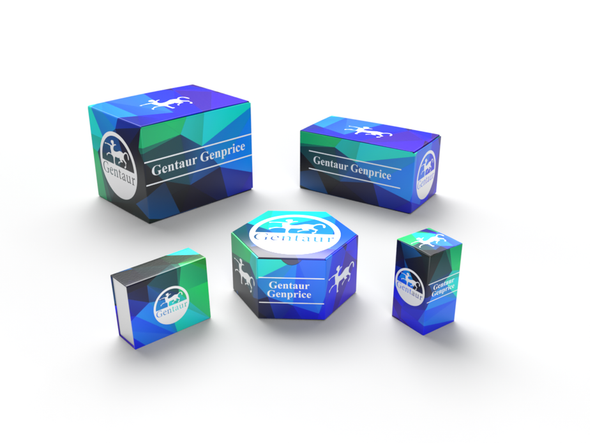Description
AMIGO1 Antibody | 7565 | Gentaur UK, US & Europe Distribution
Host: Rabbit
Reactivity: Human, Mouse, Rat
Homology: N/A
Immunogen: AMIGO1 antibody was raised against a 19 amino acid peptide near the carboxy terminus of human AMIGO1.
The immunogen is located within the last 50 amino acids of AMIGO1.
Research Area: Neuroscience
Tested Application: E, WB, IHC-P, IF
Application: AMIGO1 antibody can be used for detection of AMIGO1 by Western blot at 1 - 2 μg/ml. Antibody can also be used for Immunohistochemistry starting at 5 μg/mL. For immunofluorescence start at 20 μg/mL.
Antibody validated: Western Blot in human samples; Immunohistochemistry in human samples and Immunofluorescence in human samples. All other applications and species not yet tested.
Specificiy: AMIGO1 antibody is human, mouse, and rat reactive. AMIGO1 antibody is predicted to not cross-react with AMIGO2 or AMIGO3.
Positive Control 1: Cat. No. 1201 - HeLa Cell Lysate
Positive Control 2: Cat. No. 10-301 - Human Brain Tissue Slide
Positive Control 3: N/A
Positive Control 4: N/A
Positive Control 5: N/A
Positive Control 6: N/A
Molecular Weight: Predicted: 54 kDa
Observed: 55 kDa
Validation: N/A
Isoform: N/A
Purification: AMIGO1 antibody is affinity chromatography purified via peptide column.
Clonality: Polyclonal
Clone: N/A
Isotype: IgG
Conjugate: Unconjugated
Physical State: Liquid
Buffer: AMIGO1 antibody is supplied in PBS containing 0.02% sodium azide.
Concentration: 1 mg/mL
Storage Condition: AMIGO1 antibody can be stored at 4˚C for three months and -20˚C, stable for up to one year.
Alternate Name: AMIGO1 Antibody: ALI2, AMIGO, AMIGO-1, ALI2, KIAA1163, Amphoterin-induced protein 1
User Note: Optimal dilutions for each application to be determined by the researcher.
BACKGROUND: The amphoterin-induced gene and ORF (AMIGO1) protein is a brain-enriched, glycosylated transmembrane immunoglobulin (Ig) superfamily protein with six extracellular leucine-rich repeats (LRRs) and one Ig-like domain. It and the related proteins AMIGO2 and AMIGO3 are thought to be cell adhesion molecules expressed on fiber tracts of neuronal tissues and participate in their formation (1) . AMIGO1 has also been suggested to play important roles in dendritic outgrowth during development and could modulate the survival of developing and adult neurons (2) .






![AMIGO1 Antibody (C-term) [APR11395G] AMIGO1 Antibody (C-term) [APR11395G]](https://cdn11.bigcommerce.com/s-1rdwiq712m/images/stencil/590x590/products/55707/56011/gentaur-genprice__26005.1661610467__29809.1661628092__75433.1661676199__77988.1661684280__64362.1661692443__97898.1661836536.png?c=1)